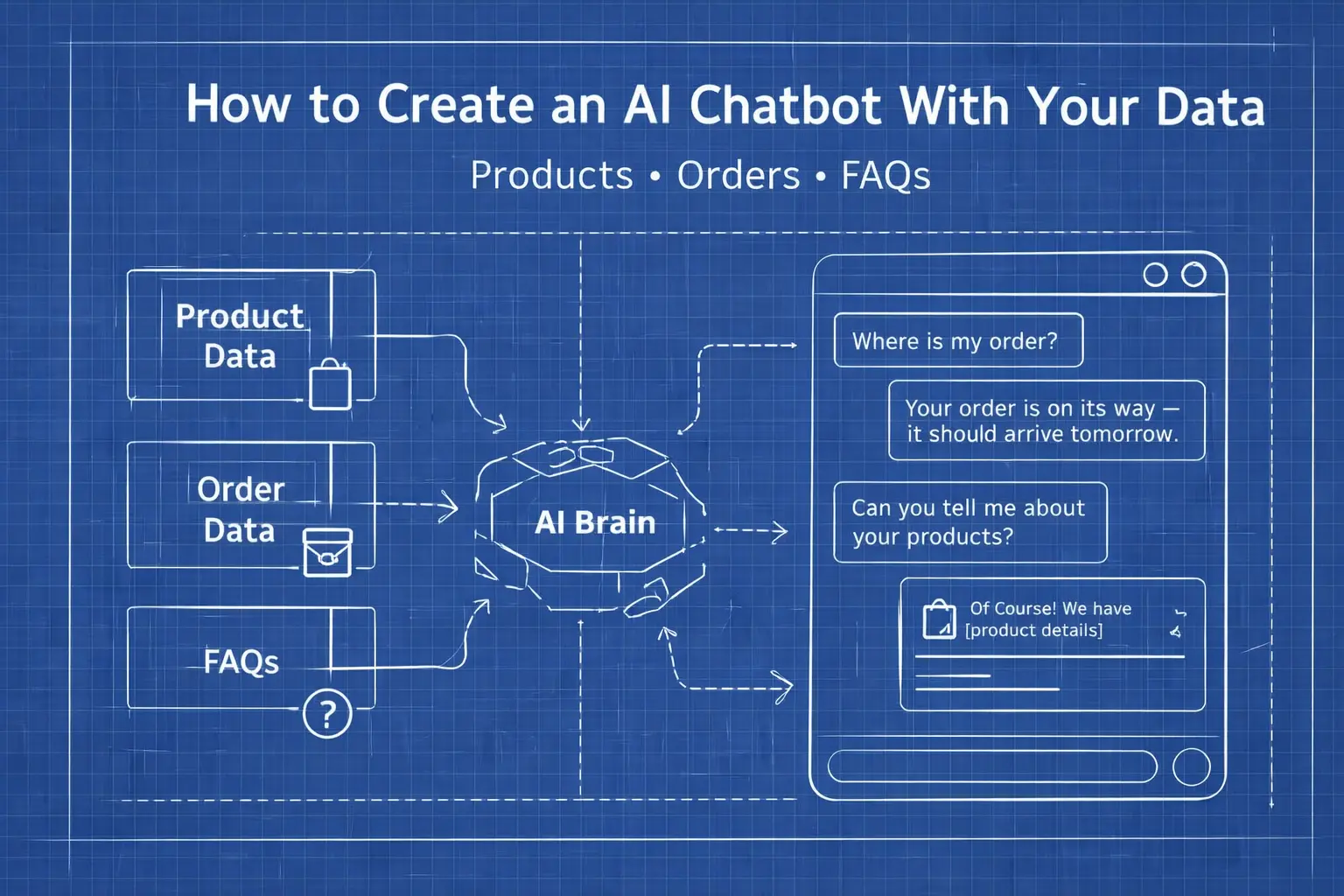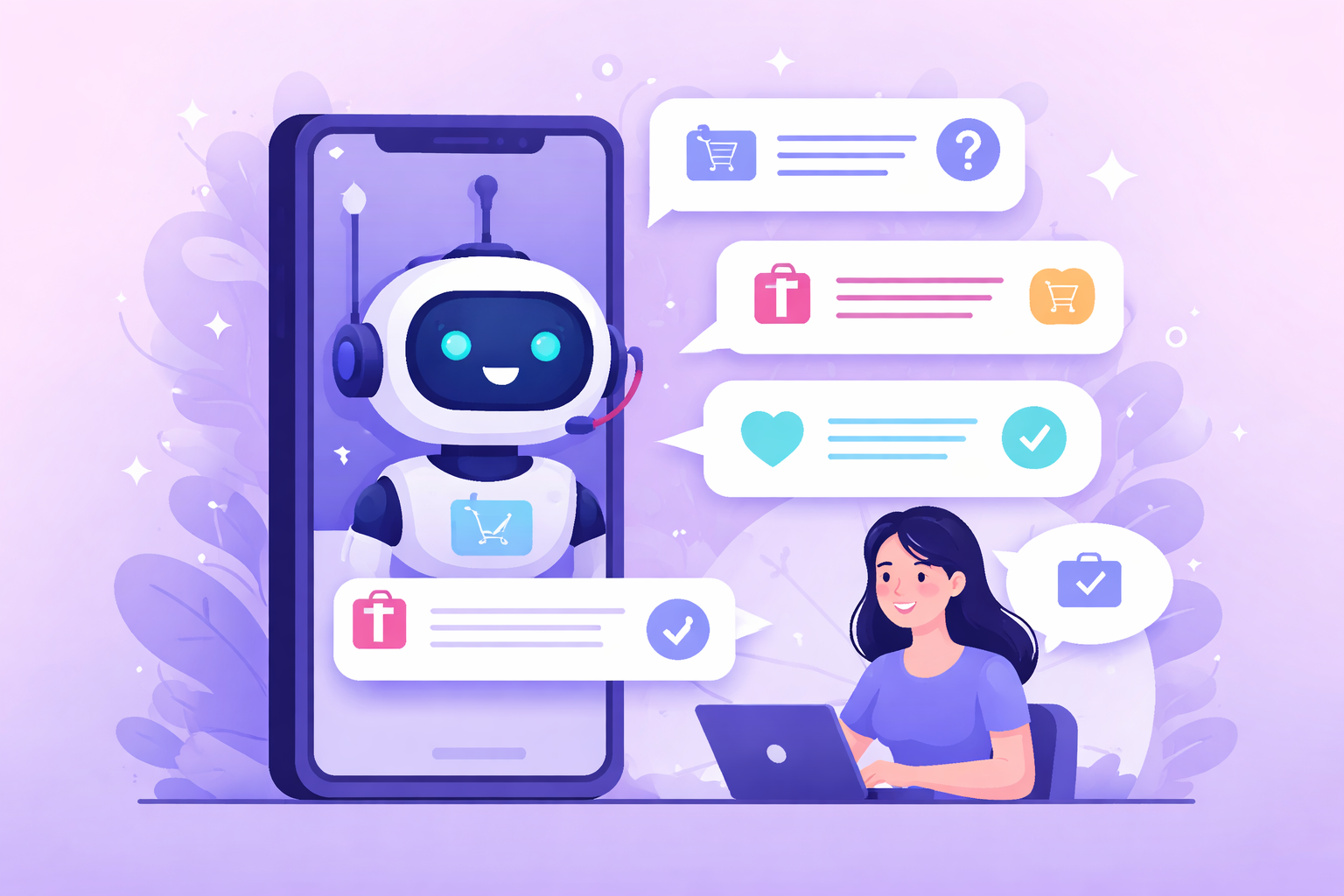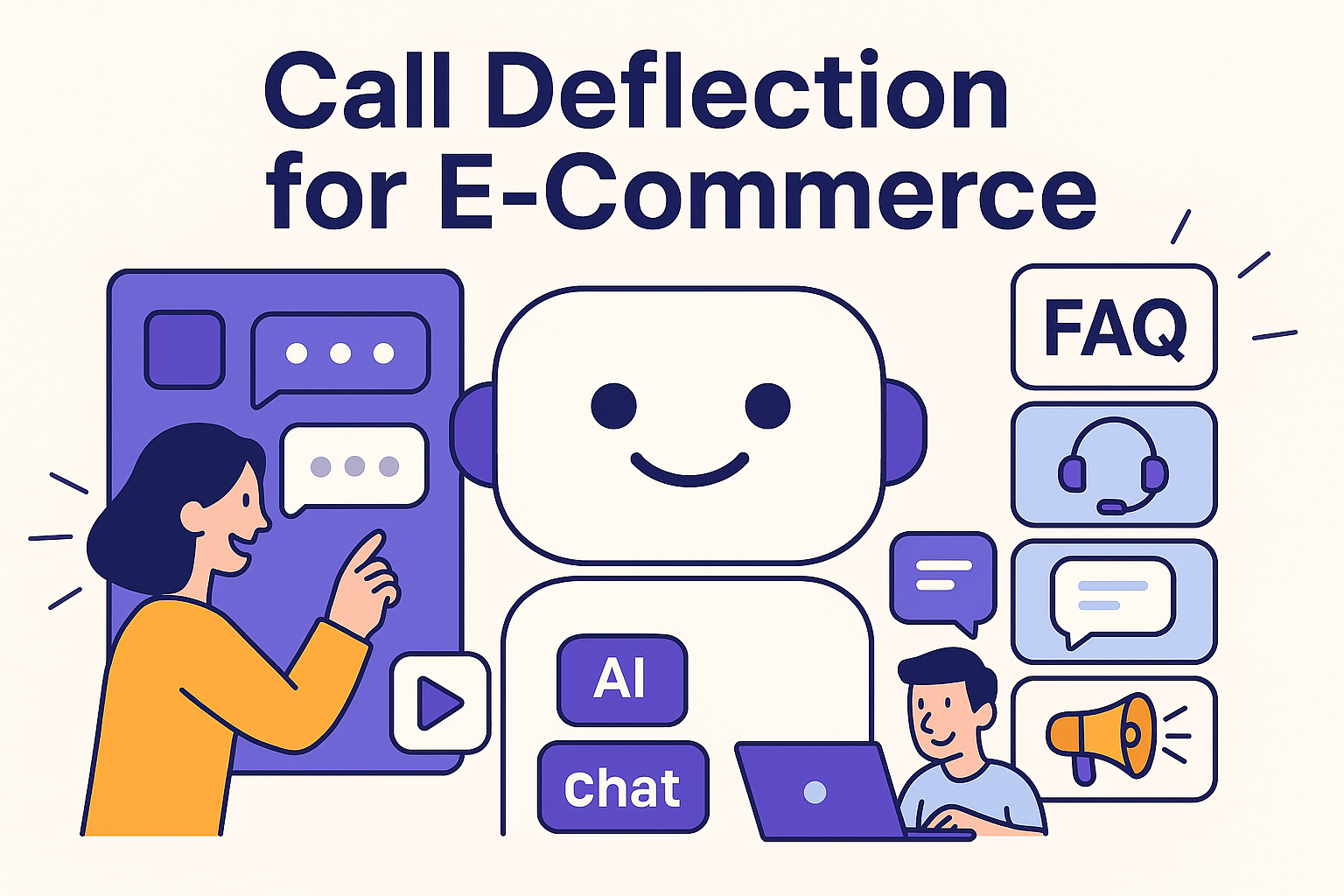Best Ecommerce Chatbots Compared (20+ Tools for 2026)
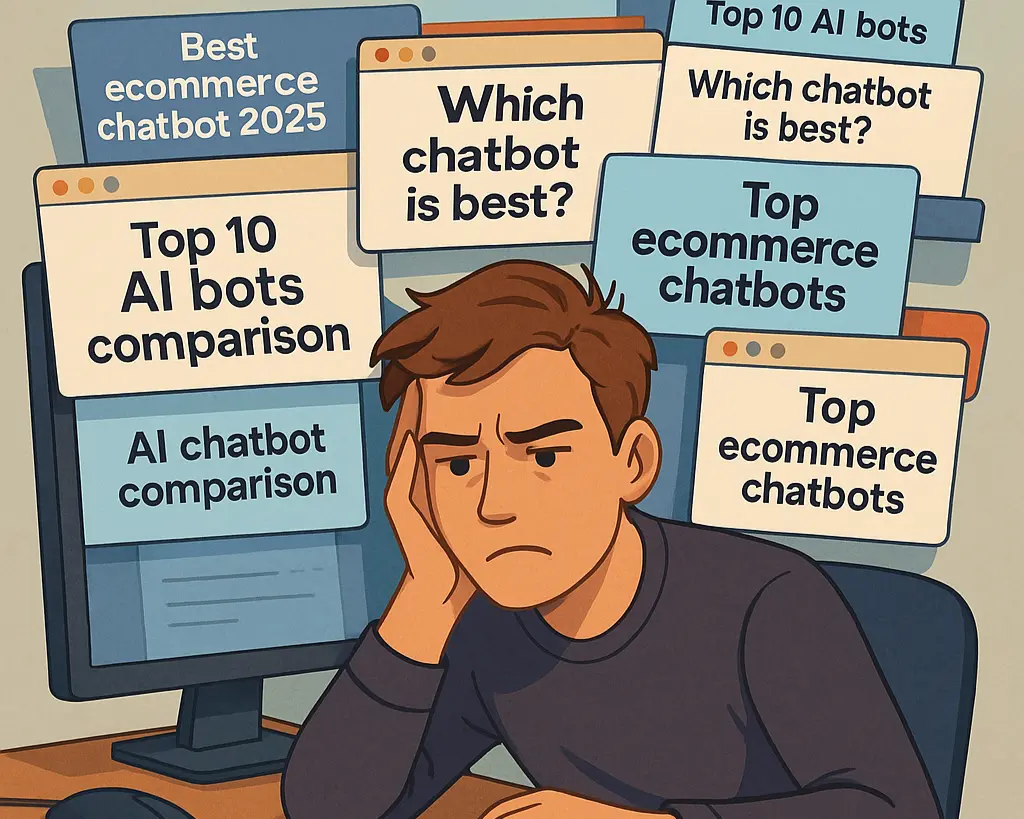
Let’s be honest, you’ve probably opened five tabs comparing AI chatbots for e-commerce already.
Every list claims to feature the best ecommerce chatbots that “boost customer experience by 47%”, “cut support costs by 63%”, and “increase sales”.
But here’s what none of them tell you. Which chatbot platform actually fits your store, integrates fast, and delivers a real customer experience?
In 2026, online retailers want more than bots that chat. They need automation that works across live chat, order tracking, and personalized product recommendations, all through smooth omnichannel support.
So we tested more than 20 of the most-talked-about ecommerce chatbots out there. Some impressed us, some didn’t. Most fell somewhere in between.
Let’s find a chatbot that actually works, not just the one that looks good in ads.
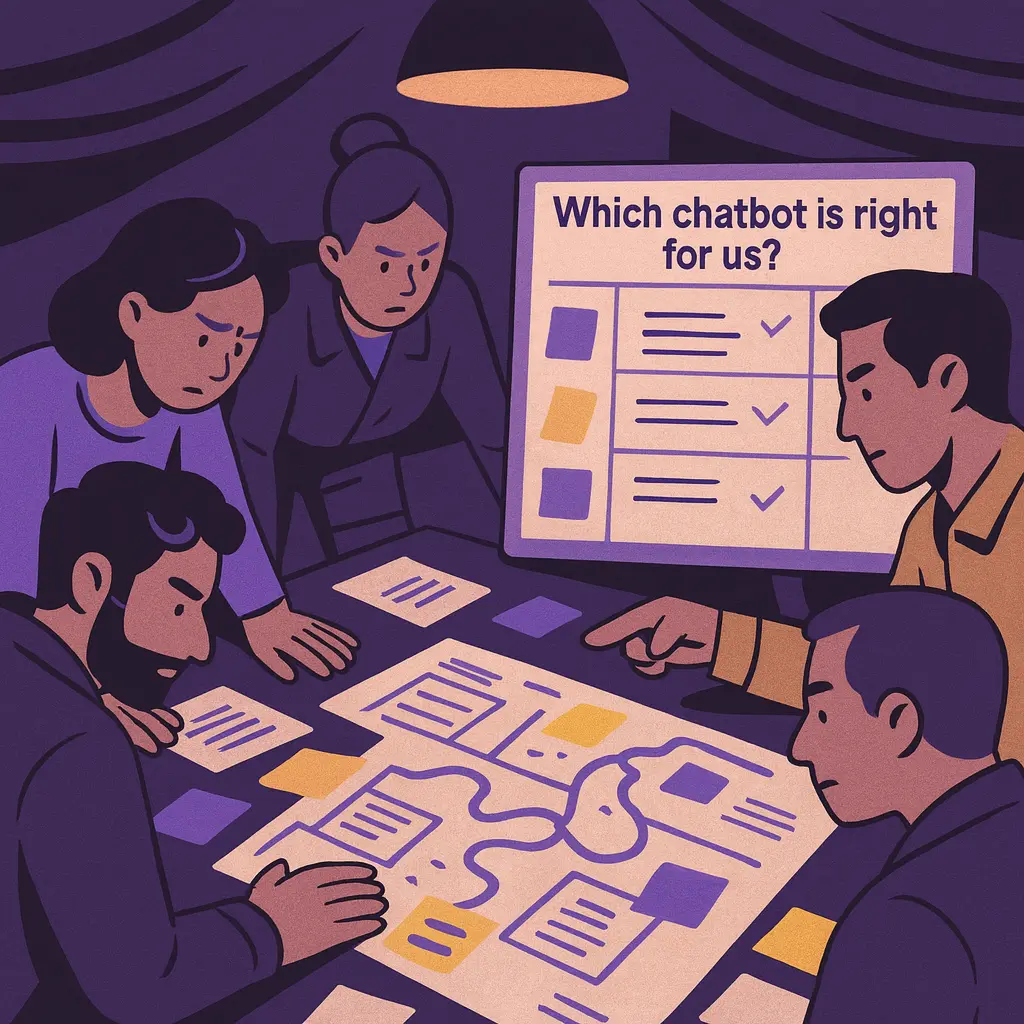
Key Features of E-commerce Chatbots
Before we even look at names and pricing pages, let’s talk about what actually matters.
These are the things that separate a chatbot that saves your team hours from one that just adds another tab to your browser and chaos to your sales experience.
Because flashy demos and “AI-powered” buzzwords mean very little if your customers still can’t get a straight answer or worse, if your team ends up doing damage control for conversations gone wrong.
A great chatbot improves both sides of the equation:
• For customers, it delivers instant responses, personalized responses, and a smoother online shopping experience.
• For your team, it reduces workload, aligns with your agent-facing needs, and integrates with tools that drive efficient customer service.
If you’re serious about automating customer service, improving product discovery, and turning chat into a real revenue channel, here’s what actually makes a chatbot great in ecommerce.
⏳ No time to waste? Jump straight to the full comparison of all ecommerce chatbots.
Time to Deploy
(How fast can it go live and start delivering value?)
In e-commerce, every week counts. Whether you’re prepping for Black Friday, fixing a support backlog, or launching a flash sale, you don’t have time to babysit another tech rollout.
A good ecommerce chatbot should go live in days, not weeks. Look for platforms with prebuilt Shopify, Magento, or BigCommerce integrations, direct connectors for your CRM system or order management system, and instant setup for channels like WhatsApp, Instagram, or Facebook Messenger.
If you still need a dev to “help finish the setup” after two weeks, something’s wrong.
Automation
(How many tickets can it really take off your team’s plate?)
“AI-powered” sounds nice, but what does it really mean? A great chatbot can handle up to 70% of the most common customer queries like order tracking, returns, shipping policies, product recommendations or cart abandonment on its own. (NorthOne) If you would still need to manually answer basic questions like “Where is my order?”, your bot isn’t doing its job.
Real-Time Access to Product Data
(Does it actually know what you sell?)
Does the chatbot understand what you actually sell? A chatbot that recommends products without knowing what’s in stock or what fits together is just guessing. Look for bots that connect directly to your product catalog, understand tags and inventory levels, and can suggest personalized product recommendations based on customer intent.
If someone types “waterproof trail shoes under $100,” the answer shouldn’t be “Check out our new sandals!” If chatbot can’t access your product catalog, check inventory levels, surface personalized recommendations, or explain differences between similar SKUs, it may not be the right choice.
💡 Curious how the right chatbot can boost your conversion rate? Here’s guide on how to turn product questions into revenue.
Tone, Language and Conversation Quality
(Does it sound like your brand or like a bad FAQ page?)
Ecommerce is global and so are your customers. A great chatbot should handle multilingual support without sounding like it went through machine translation.
Look for tools that let you customize tone of voice, add emojis or product visuals. It should adapt to your brand voice, whether you’re selling luxury cosmetics or performance cycling gear. And it should respond clearly, naturally, and helpfully not like an outdated FAQ page.
Great chatbots understand grammar, formality, and even region-specific product questions. “Trainers” in the UK? “Sneakers” in the US? “Buty sportowe” in Poland? The best chatbots feel like your brand’s best support rep, only faster and available 24/7.

Okay, enough theory. Let’s meet the bots
25 Best Ecommerce Chatbots
Now that you know what separates the good from the gimmicks, let’s look at the actual players.
We reviewed all of the most popular ecommerce chatbots. Some are great for getting started. Some are built for scale. And a few are… surprisingly outdated. Each one has its own strengths. Some deploy fast but lack depth. Some have brilliant AI but take weeks to train. Some shine on WhatsApp, others dominate in-product chat.
But here’s the key: Only a few truly check all the boxes we outlined above. These are the platforms that actually do the job whether it’s automating order updates, recovering carts, or selling smarter.
Below is a list of the 25 best chatbots for e-commerce in 2026, with a quick summary of each platform’s strengths and ideal use case.
No time (or patience) for 25 tools? Head straight to the section where we break down the top 3 platforms we’d choose.
1. Re:Amaze
Re:amaze is a solid choice if you want one inbox for all your channels such as email, chat, Instagram or Messenger. It helps your team stay on top of support with built-in Shopify integration and automatic bots for FAQs and order tracking. Want a smart AI chatbot? Keep looking. Re:amaze is mostly rule-based, great for handling WISMO tickets and answering FAQs, but limited when it comes to NLP or real-time personalization. Don’t expect any smart AI or real sales impact. It’s here to answer, not to convert.
2. Tidio
Tidio is the plug-and-play chatbot for small ecommerce teams who need something live today. With visual flows, prebuilt bots, and live chat baked in, it handles FAQs, order tracking, and handoffs without code. It connects smoothly to Shopify and others. But its AI is basic and it can’t do both AI and custom logic at once. It’s ideal for covering common questions and passing to agents when needed, but for growth or smart automation, you’ll want more.
3. Gorgias
Gorgias is purpose-built for ecommerce teams juggling thousands of daily support tickets. It connects to Shopify, Magento, and others at the data level, so agents don’t just respond but can instantly refund orders, check tracking, or modify orders inside the inbox. Its AI handles common requests and flows like returns or cancellations with zero coding. It’s not cheap, but for growing teams that treat support as a revenue channel, it delivers. Just be warned: pricing is per-ticker and scales fast with usage.
Gorgias chatbot shines for ticket routing and agent workflows, but its AI automation is still in early stages. Many users end up using Gorgias for support + a second tool for sales chat or multilingual AI.
4. Intercom
Intercom isn’t your typical ecommerce helpdesk. It’s an all-in-one platform sitting at the crossroads of support, marketing, and automation. At its core is the GPT-4-powered AI assistant “Fin,” which pulls answers to support tickers straight from your help center. You can track user behavior, send popups on checkout, or guide customers with product tours. The tradeoff? Pricing can balloon with usage, and setup isn’t beginner-friendly. If you’re a small store, it’s probably overkill. But if you’ve got the team, the tech, and the budget, it’s one of the most sophisticated tools you can buy.
5. Chatfuel
Chatfuel is a no-code chatbot creator optimized for social messaging (Messenger, Instagram DM). E-commerce brands with an active Instagram or Facebook presence use it to automate FAQs, run quizzes, recommend products, and send broadcast messages. It supports visual flow building. With API integration, you can bring in order lookup or dynamic product data. But it doesn’t offer native web chat beyond Messenger widgets, and handing off to agents or running email support requires external tooling. While it now includes some AI fallback for unmatched queries, it remains heavily tied to the Meta ecosystem.
6. LivePerson
If your e-commerce brand handles thousands of messages daily, LivePerson brings heavy-duty AI and orchestration. You can deploy multiple bots and integrate with CRMs. LivePerson also supports voice-to-chat handoffs. Advanced AI bots, called Conversational AI, can handle complex flows, product recommendations and order status queries. The platform is powerful, but complexity and cost mean it’s not for small or medium stores unless you’re ready for an enterprise-level investment.
7. Richpanel
Richpanel is for e-commerce teams drowning in “Where is my order?” emails. Customers log in via email or order number and its self-service widget lets them track orders, start returns, or find answers. If self-help fails, they’re routed to a human agent via chat, email, or social channels. Richpanel pulls in real-time Shopify and WooCommerce data, so agents can refund, edit, or view orders directly. However, its AI is limited to intent detection and response suggestions and it does not offer true AI-driven product recommendations. Pricing is based on monthly ticket volume and starts affordably, but can scale up with usage.
Richpanel reduces ticket volume by 30‑40 % for most Shopify stores, yet its AI stops at intent detection. No generative chat, no smart recommendations. It’s perfect for order tracking, not upselling.
8. Sleekflow
SleekFlow is built for e-commerce teams that sell through messaging, think WhatsApp, Instagram DMs, or WeChat. It unifies all channels into one inbox, automates replies with a visual flow builder, and enables agents to send product recommendations or payment links directly in chat. It provides automation flows for structured conversations but true AI is limited. Pricing starts at $149/month.
9. Olark
Olark is a lightweight live chat tool built for small teams who want to keep things simple. Built without AI or multichannel complexity, it focuses on real-time 1:1 support via a customizable widget that’s easy to deploy and train on. You embed a widget, customize the look, set up some automation rules, and you’re live. Agents can see what page visitors are on, share files, and transfer chats. At $19–29 per agent per month, it’s one of the most straightforward tools on the market. Just don’t expect deep automation or omnichannel features.
10. Zowie
Zowie is an AI‑powered automation tool built specifically for ecommerce support teams. With plug‑and‑play integrations for Shopify, Magento, and WooCommerce, it can automate up to 70 percent of repetitive tickets such as order tracking, returns, or refunds. The chatbot learns from your product catalog and customer data to deliver precise answers in 100 + languages. Furthermore, Zowie Inbox empowers agents with AI‑suggested replies. For smaller shops, however, the enterprise pricing and limited customization may outweigh the benefits.
⚠️ Spoiler Alert: This isn’t the last time you’ll hear about Zowie. It's one of our top 3 picks we will introduce in more detail below.
11. Kommunicate
Kommunicate gives small e-commerce teams the power to automate without losing the human touch. It connects to WhatsApp, Messenger, your website, or even mobile apps and all chats go into one dashboard. While Kommunicate includes a no-code bot builder for basic automation, deeper e-commerce use cases like backend integrations, order lookups, or product logic require developer setup and aren’t available out of the box. With pricing starting around $40–$100/month, it’s a budget-friendly way to step into AI support.
12. HubSpot Chatbot
When your marketing, sales, and support teams already live in HubSpot, its chatbot is a natural extension. You can create rule-based bots via a drag-and-drop builder. The bot can pre-qualify visitors and hand off to agents, and every chat becomes part of the contact’s CRM record. But the bot is tree-based, not AI, and native e‑commerce features (order lookups, refunds) require setup. A good fit if you already committed to HubSpot, but less enticing as a standalone chat tool.
HubSpot’s chatbot is designed for lead qualification, not ecommerce fulfillment. There’s no native link to product feeds or order data. It's perfect if you’re already using HubSpot CRM, but limited for storefront automation.
13. Zoho SalesIQ
Zoho SalesIQ is a live chat and visitor intelligence platform tailored for small to mid-sized e-commerce brands, especially those already using Zoho CRM or Desk. SalesIQ blends website chat with analytics and light automation. You can see what visitors are doing on your site, trigger bots based on behavior, and connect chat to CRM or support systems. Its no-code Zobot builder works for basic flows, but more complex use cases require scripting. While not purpose-built for Shopify or WooCommerce, SalesIQ shines inside the Zoho ecosystem, offering one of the best price-to-value ratios for small businesses wanting live chat + analytics + CRM in a single tool.
14. Shopify Inbox
Shopify Inbox is a free, built-in live chat tool that works natively inside Shopify. It’s perfect for small store owners who want to talk to shoppers without paying for extra apps. It adds a customizable widget to your storefront. Messages appear in the Shopify admin or mobile app, and you can reply even after the customer leaves (they’ll get an email). Plus, Shopify Magic provides instant replies to FAQs like “Where’s my order?” and you can connect Messenger and Instagram DMs to centralize everything in one place. You won’t get fancy AI or ticketing, but for lightweight support and sales, it works surprisingly well.
15. Trengo
Trengo is the Swiss Army knife of omnichannel support. It consolidates all conversations across 10+ channels into a single team inbox. Support teams can assign tickets, leave internal notes, and even chat with each other right in the platform. It’s especially powerful in WhatsApp-heavy regions like the EU and LATAM. However, its AI capabilities are lighter than some competitors as automation is more rule-based than AI-native. Its pricing is user-based with conversation limits, making it affordable but slightly unpredictable at higher volumes.
Trengo’s WhatsApp integration is among the strongest in Europe, but its automation engine is rule‑based. Expect smooth omnichannel visibility, but not deep AI reasoning or product‑recommendation logic.
16. Botpress
Botpress suits e-commerce brands that see a chatbot as a development project. Its visual flow editor plus code nodes let you build hybrid bots that tap into inventory systems, recommend products, and handle complex flows. It supports multi-channel bots and integration with external NLP engines like GPT‑4, letting you mix structured flows with AI. But it’s not plug-and-play: you’ll need engineering resources to build integrations, maintain infrastructure, and extend features. If your team is technically strong and your needs are unique, Botpress offers unmatched flexibility. If you want something live in days with minimal setup, a SaaS chatbot may be more fitting.
17. Ada
Ada is built for e-commerce brands with serious support volume. It connects to Shopify, Salesforce, and other tools to automate order updates, returns, and FAQs using live data. It works across channels (chat, SMS, email, social), supports over 50 languages, and lets you fully customize the tone of voice to match your brand. It can trigger chats based on user behavior and hand off complex issues to agents with full context. But it’s not cheap. Pricing is only custom, and setup requires a mature team.
Ada supports 50 + languages and robust Salesforce / Shopify integrations, but its power comes at a cost. Enterprise‑only pricing and a learning curve measured in weeks. Small brands often find it too heavy to deploy.
18. Freshdesk
For Shopify sellers or WooCommerce shops already using Freshdesk, Freshchat is the natural live chat extension. It includes a team inbox for channels like web, WhatsApp, and Instagram; Freddy AI bots for deflecting FAQs and smooth handoff to agents through tools like IntelliAssign. Thanks to native ties with Shopify, agents can access customer data during chats. However, its AI is mainly scripted. With that said, it may lack the depth and polish of top-tier competitors.
19. Crisp
Crisp is a lightweight customer messaging platform for growing ecommerce brands that want live chat, multichannel support, and basic automation, all in one shared inbox. It connects web chat with Facebook, Instagram, email, and more, so teams can respond from a single place. Crisp’s AI Agent, available on higher-tier plans, uses your help center and website content to answer questions like “Where’s my order?” or product FAQs, with support for over 100 languages. However, order status checks or product suggestions require API setup, and the best features only come with the $295/mo Plus plan.
20. Zendesk
Zendesk is a heavyweight in customer support, ideal for large e-commerce retailers or marketplaces handling high ticket volumes across chat, email, voice, and social. Its Answer Bot deflects up to 40% of repetitive queries by suggesting help articles, while the Flow Builder enables basic no-code bot automation. Shopify, Magento, and custom API integrations are available, but require configuration. It works well when paired with a rich help center but isn’t great for open-ended questions unless backed by external AI or premium automation tiers.
21. AMIO
Amio is a purpose-built AI chatbot platform for e-commerce that connects directly to your product feed, order system, and helpdesk to automate up to 95% of customer inquiries like “Where is my order?” or “Do you have size M?”. It recommends products from your catalog using GPT-powered conversation, handles post-purchase support, and integrates across web chat, WhatsApp, and Messenger. It connects directly to your Shopify, Magento, or WooCommerce backend and uses your live product feed to answer real-time product queries, track orders, and recommend items in natural conversation. It’s best for mid-sized shops ready to scale support and sales through automation, though smaller stores may find the starting price steep.
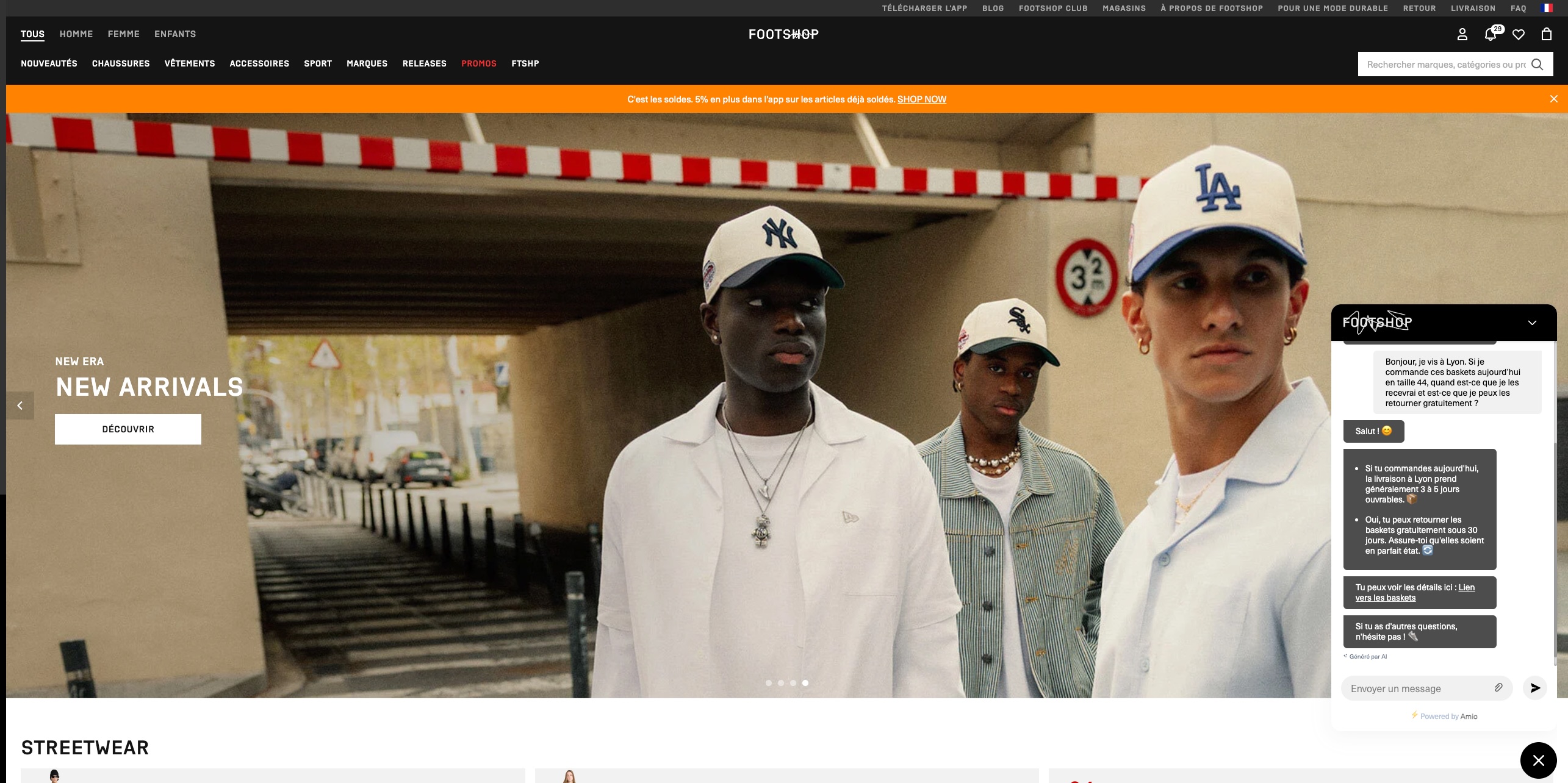
22. Heyday
Heyday helps ecommerce teams manage thousands of daily conversations across multiple channels. It centralizes all messages from social DMs, web chat, and messaging apps into one place and uses AI to handle common requests automatically. Shoppers can track orders, start returns, or ask for product advice through the chatbot. Deep Shopify integration enables real‑time access to product and order data. The setup is fast and requires no coding, but customization beyond templates can be tricky. Weaknesses also include lack of transparent pricing because buyers must request a quote to get started.
23. Tawk.to
Tawk.to is a 100% free live chat platform trusted by millions of businesses for real-time, human-first support. It offers unlimited agents, multilingual widgets, mobile apps, CRM-style contact tracking, and proactive visitor engagement, all without charging a cent. With its new AI Assist (Apollo), Tawk.to now supports GPT-powered answers from your knowledge base, letting it handle basic automation like FAQs and WISMO tickets. You can also hire real agents via their built-in VA service for 24/7 support. Tawk.to is great for free live chat, but its AI capabilities are very limited and doesn’t offer native order management or advanced e-commerce features.
24. HelpCrunch
Think of HelpCrunch as Intercom-lite, without the price tag. It offers website chat, email automation, and a knowledge base, everything a small online store needs to support and convert visitors. You can set up proactive engagement like auto-messages based on page behavior. Its rule-based automation (not AI) supports basic workflows like cart follow-ups or timed offers, while the knowledge base helps deflect common queries. HelpCrunch lacks advanced integrations There’s no AI bot, but it’s incredibly easy to deploy and scale. Pricing starts at ~$15/agent with no limits on contacts or chat volume, or a flat $495/month unlimited plan.
Which E-commerce Chatbot is best?
From our deep dive, these these are the three chatbots we’d actually recommend. they’re the ones backed by features, results, and actual store impact.
They’re not perfect, but they do what matters: automate support, recommend products, and boost conversions. That’s what counts. Here’s why we think they deserve your attention.
Amio
If you’re ready to stop treating support like a cost center and start turning it into a revenue channel, Amio might be the chatbot you’ve been waiting for. It doesn’t just answer tickets but connects to your live product feed, pulls order data in real time, and resolves 90% of common queries without sounding like a robot. For mid-sized e-commerce stores with real traffic and real goals, AMIO turns AI into an actual business tool, not a buzzword.
🚀 Deployment
- Goes live in 5–10 days with guided onboarding. Integrates with Shopify, Magento, WooCommerce, and top helpdesks like Zendesk or Gorgias. Custom flows are easy to build via no-code tools and deep APIs are there when needed.
🤖 Automation
- It excels at after-sale flows like WISMO, returns, exchanges, and even refund logic. The bot handles thousands of variants like “My package hasn’t arrived,” “I got the wrong size,” or “How do I return this?” and resolves them instantly, 24/7. GPT-enhanced logic makes replies sound natural, not scripted.
🛍 Product Integration
- Full live sync with your product catalog. That means it knows your inventory better than most of your junior agents. It can suggest “Running shoes under €100” or “Black jackets in size M that are in stock” without guessing. Even better, it knows what not to recommend. If an item is sold out, Amio won’t show it, unlike some rule-based bots that keep pushing unavailable products.
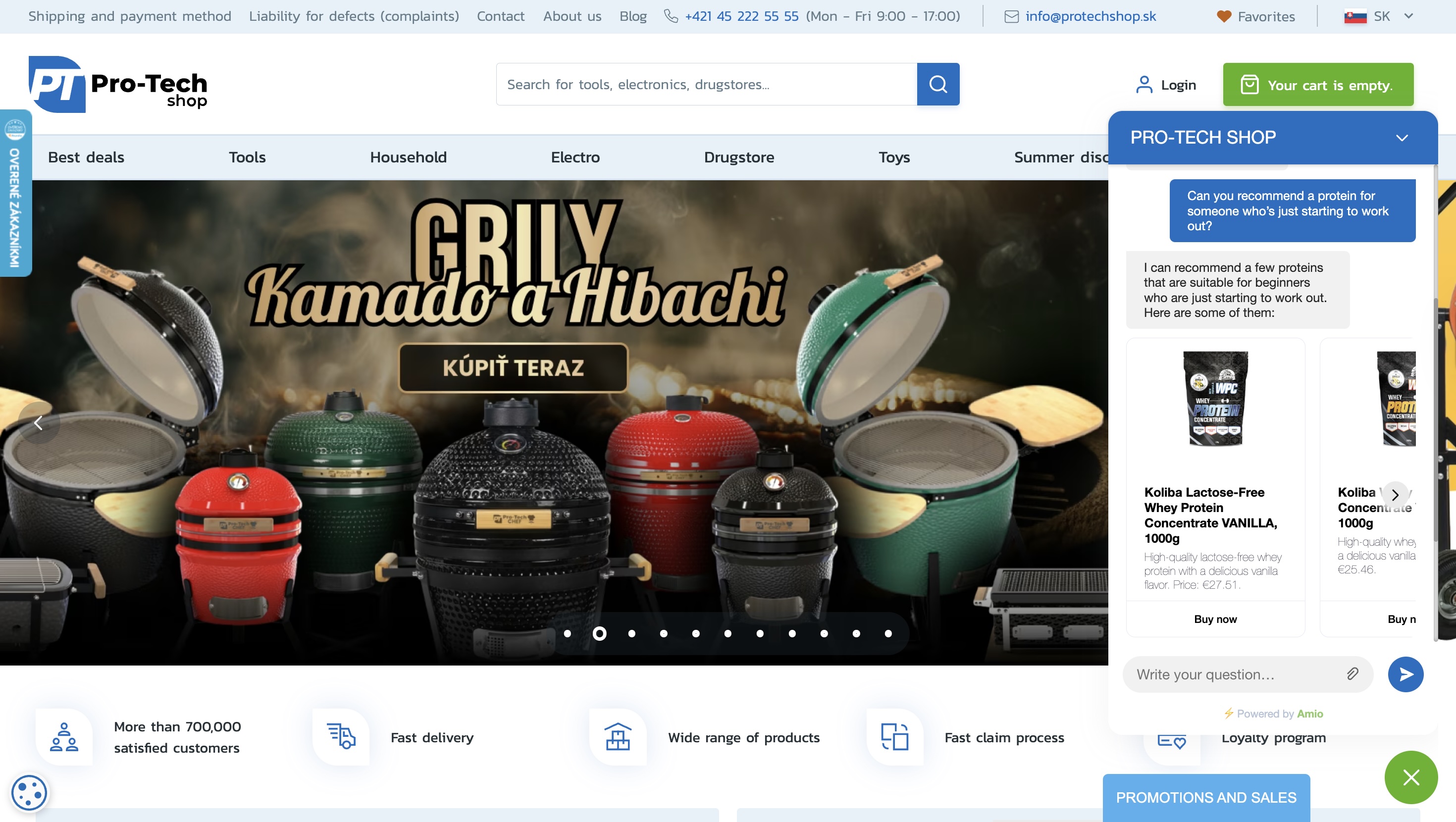
🌍 Language & Tone
- Multi-language support with tone customization. Its GPT integration handles tone well. It can be friendly, formal, brand-specific etc.
🙋♀️ Agent Collaboration
- When needed, Amio hands off to agents via Zendesk, Gorgias, or email. Handoffs include full context, and agents can jump back into the flow anytime.
📱 Omnichannel Ready
- Supports Web, Messenger, WhatsApp, email, and more.
💰 Pricing
- Starts at €150/month for basic plans. Brands pay based on message volume and advanced features, not per seat.
🧠 Best for fast-scaling ecommerce brands with high ticket volume
Amio hits the sweet spot for ecommerce brands who need real automation without enterprise bloat. It’s more powerful than basic rule-based bots, yet easier to deploy than heavy-duty CX suites. You get fast resolution, real product answers, and natural-sounding AI all without drowning in setup meetings or endless scripting. If you’re running 50–500 tickets per week, Amio is likely the sweet spot between power and simplicity.
⚙️ Want to see what AMIO looks like in action? Book a live demo and test it on your own product feed!
Tidio
If your goal is to reduce ticket volume today without hiring a dev or scheduling onboarding calls, Tidio delivers. It’s fast, easy to launch, and handles the most common support tasks out of the box. While it won’t power a personalized product quiz or connect to your full catalog, it’s one of the smoothest ways to get started with chat automation when time and budget are tight.
🚀 Deployment
- Goes live in under a day with plug-and-play integrations for Shopify, WordPress, and Messenger. No code, no wait.
🤖 Automation
- Covers basic support flows like tracking, returns, and availability. Upselling or multi-step logic needs manual setup.
🛍 Product Integration
- Doesn’t sync with your live catalog. Product suggestions rely on keyword rules or predefined paths.
🌍 Language & Tone
- Supports multiple languages and lets you adjust tone, but messages may sound robotic unless fine-tuned.
💰 Pricing
- Free plan available. Paid tiers start at $29/month, with AI-powered chat only in higher plans.
🧠 Best for small e-shops that need a chatbot live by end of day, want to deflect basic tickets fast, and are okay with keeping things simple on the product side.

Tidio is ideal for lean teams who want fast results with minimal setup. It’s great for handling FAQs, tracking questions, and simple support flows. But as soon as you want smarter product recommendations, deep ecommerce logic, or scalable automation, you may hit a ceiling. Customization is possible—but it requires time, manual effort, and a tolerance for scripted feel. For stores expecting to grow fast or wanting a bot that truly sells, Tidio may not keep up.
Zowie
Zowie is what happens when you mix no-code chatbot builders with real ecommerce intelligence. It’s fast to deploy, scary smart at answering FAQs, and built for brands tired of copy-pasting tracking links. Big names like L’Oréal and Avon use it to automate up to 70% of chat tickets, detect when customers are ready to buy, and boost conversions by 40%. Not bad for a bot that goes live in a week.
🚀 Deployment
- Zowie gets up and running quickly with plug-and-play integrations for Shopify, Magento, WooCommerce, Zendesk, Gorgias, and more. No-code setup and pre-trained workflows mean your bot is handling real tickets before your coffee goes cold.
🤖 Automation
- Strong at handling repetitive questions like “Where is my order?” or “How do I return an item?”. Multi-step logic and edge-case handling exist, but often require manual tuning and feel a bit rigid compared to other platforms.
🛍 Product Integration
- Zowie syncs with your live catalog to recommend actual products in stock. That said, recommendations tend to be rule-based and lack the context or nuance needed for truly conversational selling.
🌍 Language & Tone
- Zowie speaks your customers’ languages. You can customize tone to match your brand (from luxury calm to Gen Z sass), though occasional translation glitches still sneak in.
🙋♀️ Agent Collaboration
- Agents can jump in anytime via Zendesk or Zowie’s own Inbox. Hybrid conversations are smooth, and AI even suggests replies (which agents can totally ignore).
📱 Omnichannel Ready
- Web, mobile, Messenger, WhatsApp, Insta DMs, you name it. Zowie handles chats across platforms and keeps context intact. There’s also a voice version (Zowie Voice), but that’s a separate product.
💰 Pricing
- Outcome-based pricing with annual contracts. You pay based on the automation work delivered, which can be a blocker for smaller or budget-conscious brands.
🧠 Best for fast-growing D2C brands and mid to large sized ecommerce teams
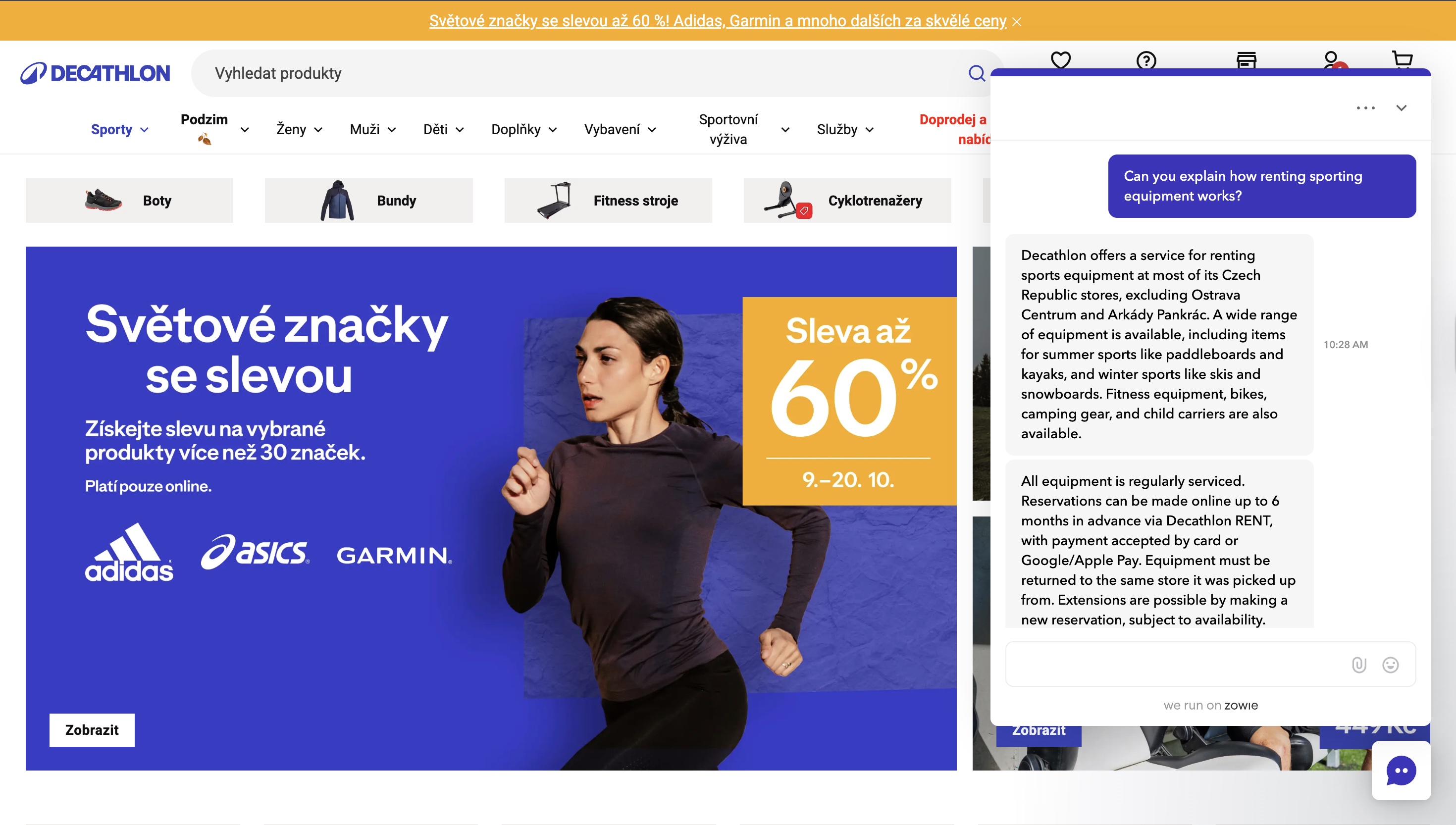
Zowie is a strong choice for brands that need quick automation wins and can afford enterprise‑grade software. It handles repetitive tickets well and speaks multiple languages, making it great for scaling support. If you’re a high-volume store scaling fast (hello, Black Friday), this bot’s for you. But if you’re a 3-person shop with 15 tickets a day, Zowie might be overkill.
Read this before choosing any chatbot
That’s it, you’ve just seen 24 ecommerce chatbots dissected by what really matters. We’ve covered 24 different platforms. From free live chat tools to enterprise AI powerhouses used by Decathlon or L’Oréal. From bots that deploy in a day to those that require a full IT team and a few weeks of onboarding.
Not all bots are built equal. And now, you know which ones are worth your time.
We didn’t write this guide to crown a winner. We wrote it so you can win by asking the right questions and avoiding the wrong software.
Print the checklist. Stress-test your current solution. And if you’re curious what really good looks like… you know where to look
🧠 And one last thing. Yes, we’re the team behind AMIO and yes, we wrote this guide. But we tried our best to stay objective, highlight the strengths and weaknesses of each platform, and give you a fair comparison of all the top ecommerce chatbots out there. If you’ve read this far and think AMIO might be what your team needs, we’d love to show you what it can do. 👉 Book a demo with our team
Book a 30-minute session where we will find out how AI bot can help you decrease call center costs, increase online conversion, and improve customer experience.
Book a demo